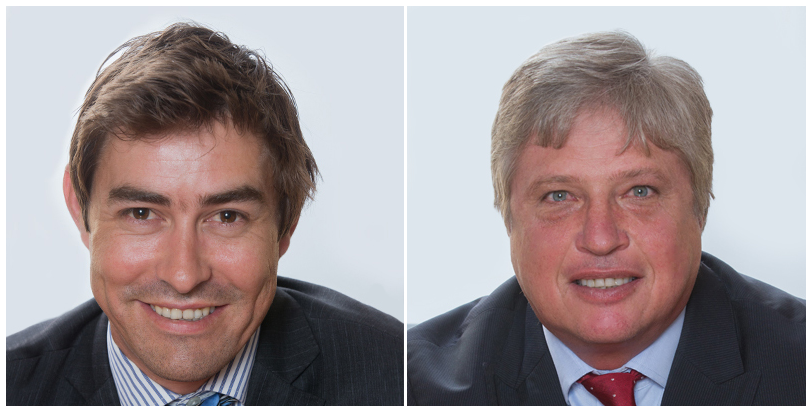Stay abreast of COVID-19 information and developments here
Provided by the South African National Department of Health
Stock picks
for 2017
As a tumultuous year winds down, our analysts look to the year ahead and choose the stocks they expect will offer the most value to our investors.
Alwyn van der Merwe, Director of Investments
Sanlam Private Wealth manages a comprehensive range of multi-asset (balanced) and equity portfolios across different risk categories.
Our team of world-class professionals can design a personalised offshore investment strategy to help diversify your portfolio.
Our customised Shariah portfolios combine our investment expertise with the wisdom of an independent Shariah board comprising senior Ulama.
We collaborate with third-party providers to offer collective investments, private equity, hedge funds and structured products.

I normally follow a particular approach to our annual stock picks. Over the years we’ve learnt that the one-year investment outcome of a limited list of shares can be very random, and I therefore pick shares using a combination of both valuation criteria and so-called momentum criteria – price momentum and earnings revision. This methodology differs somewhat from our normal stock-picking criteria where we pick shares for the long haul.
Looking back over 2016, the four stocks I picked at the end of last year all outperformed the market comfortably. Barloworld was the best performer with a total return over the year of 41.7%, followed by Sappi at 27%. Nedbank was up by 15%, and KAP by 8.5%. Our share selection methodology therefore seems to be bearing fruit.
Here are my picks for 2017:
Remgro – The Stellenbosch-based investment group gives investors exposure to listed assets such as Mediclinic and the First Rand Group, but also to a number of quality unlisted shares, which currently comprise around 22% of the net asset value (NAV) of the group. Historically, Remgro shares have tended to trade at an average discount to their NAV of 15%, and the current 18.25% discount to NAV is attractive compared to its own history.
Looking at the performance of the underlying shares, the Mediclinic share price had a torrid time over the past year as a result of one-off events, such as the Al Noor Hospitals Group transaction amounting to R788 million. Buying Remgro shares today will therefore provide investors with exposure to Mediclinic at a markedly reduced price, a quality unlisted portfolio, and a premium bank – First Rand – at an attractive discount.
(Also see: Remgro ‘now even better margin of safety’)
Metair Investments – This share was down-rated significantly over the past two or three years, mainly as a result of a one-off retooling of Metair’s South African manufacturing facility and struggling European operations largely on the back of deteriorating political relations between Turkey and Russia. With these issues now in the past, ‘normal’ business conditions will restore Metair’s margins. As a result the share should re-rate on the back of better expected performance that the market hasn’t yet discounted.
Based on our research, we’ve estimated earnings per share of R1.50 for the 2016 financial year. For 2017, we forecast earnings per share of R2.44, which translates to growth of 62%. This puts the share on an 8 times forward earnings multiple, which is very cheap. If Metair’s operational results do turn around as expected, this share will certainly reward investors.
Hudaco Industries – This business has been under pressure for a number of years, resulting from the slump in industrial production and in the mining industry since 2008. Despite tough business conditions, Hudaco has remained a well-managed company. The group has diversified its product range, making it less reliant on specific industries. Should we experience even a minimal recovery in the mining sector and industrial activity in South Africa, this share’s performance is likely to beat market expectations.
Hudaco is now trading at a forward earnings multiple of 8.7 times, which is a steep discount to the rest of the market. It is an unloved share in terms of its rating, which normally creates great opportunities for patient investors.
Barclays Africa Group (formerly ABSA Group) – Like other banks, Barclays/ABSA was under severe pressure until mid-2016 as a result of tough economic conditions. The market was also generally disappointed with management as the bank has lost prominent senior managers in recent years. The UK influence in the top structures was also concerning. The reduction of the Barclays shareholding in ABSA, and the resultant increase in local leadership, should lead to a narrowing of the discount at which the company is currently trading relative to other banks.
I believe Barclays/ABSA has managed the group’s bad debts reasonably well, for which it hasn’t received much credit. The share is trading at a forward earnings multiple of 8.3 times, which is a massive discount to the rest of the market. If the South African economy remains on its current modest recovery path, then this share is simply too cheap and should re-rate.
Pieter Fourie, Head of Global Equities at Sanlam Private Wealth UK
Sanlam Private Wealth manages a comprehensive range of multi-asset (balanced) and equity portfolios across different risk categories.
Our team of world-class professionals can design a personalised offshore investment strategy to help diversify your portfolio.
Our customised Shariah portfolios combine our investment expertise with the wisdom of an independent Shariah board comprising senior Ulama.
We collaborate with third-party providers to offer collective investments, private equity, hedge funds and structured products.

My selection of five top picks for 2017 includes two consumer staples businesses, an asset management business, a media company and a software company. All these businesses are well positioned for growth and trade on a combined free cash flow yield of 6.2% and return on invested capital of 39.7% based on consensus forecasts.
Pernod Ricard – This is the world’s second-largest wine and spirits company, with a strong portfolio of brands across the different key spirits categories. It’s the market leader in the Asian premium spirits segment, with a strong footprint in China and India. India remains a growth driver for the group, while China has slowed down since 2012 due to the anti-extravagance campaign.
Pernod’s share price has underperformed for a few years and appears attractive to us at 16 times earnings for next year. The company remains geared towards a wider recovery in liquor sales in Asia after a very subdued period over the past three years.
Nestlé – The company’s global reach and consistent organic growth is in many ways unrivalled. It has grown dividends per share by 8% compound over 25 years, and I feel it’s well positioned against competition. The company has struggled to perform over the past few years but I expect announced savings of at least 150 basis points in operating margin over the 2017–20 period, which will allow the company to compound cash operating earnings at a high single digit.
We model long-term growth in cash flow earnings of 5% per annum going forward, which should yield decent total returns after the most recent pull-back in the shares provides a more attractive entry point.
Aberdeen Asset Management – I still believe in Aberdeen’s robust investment process, and its longer term performance is testament to this. Even though the external environment is tough for the company today, it remains geared towards a general recovery in equity markets and emerging markets in particular. The stock is trading on 12 times earnings for next year and yields 5% at current levels. If equity markets continue to grind higher, Aberdeen should benefit from this by virtue of its positive operational gearing to higher equity markets.
Alphabet (Google) – I continue to recommend Google as a long-term core holding as it remains the dominant global search engine with more than 65% of search budgets in the US alone. The sub-industry is growing by more than 14% year on year for the foreseeable future and Google, as the undisputed leader in this segment, is well positioned to capture a disproportionate share of this growth – fuelled by mobile – at a time when competitors are languishing. The company is trading on a free cash flow yield of 5% while the operating free cash flow will continue to grow at least 12% per annum for the next three years. The company also boasts net cash of US$80 billion by year end.
Oracle – The company’s free cash flow yield of 7.5% remains attractive versus its peer group. The investment community continues to question Oracle’s ability to successfully negotiate the strategic move away from on-premises software solutions towards a subscription-based cloud software solution for its customers.
I believe shares should react favourably as cloud numbers continue to be better than expected and as the legacy business performs in line with broader market expectations. Oracle’s management remains confident that software as a service can continue to grow comfortably at a rate above 50% for the foreseeable future to compensate for the loss of revenue on its legacy business as the company continues to integrate acquisitions completed over the past few years.
Sizwe Mkhwanazi, Portfolio Manager
Sanlam Private Wealth manages a comprehensive range of multi-asset (balanced) and equity portfolios across different risk categories.
Our team of world-class professionals can design a personalised offshore investment strategy to help diversify your portfolio.
Our customised Shariah portfolios combine our investment expertise with the wisdom of an independent Shariah board comprising senior Ulama.
We collaborate with third-party providers to offer collective investments, private equity, hedge funds and structured products.

Anheuser-Busch InBev (AB InBev) – When AB Inbev bought SABMiller it ended the 119-year relationship of one of South Africa’s most loved companies with the JSE. Part of this US$109 billion mega-deal was listing AB InBev on the JSE. Management is well known for cutting costs, with CEO Carlos Brito leading by example. The company plans to reduce employee numbers by around 5 500, which will lead to savings of around US$1.4 billion.
Earnings are expected to grow between 7% and 9%, and operating margins should improve from 31.9% to 33% over the next few years. This share offers rand hedge qualities and at the current level of about R1 450.00 offers good value over the long term.
Standard Bank – Standard Bank plans to invest US$100 million in ICBC Standard Bank, which will put the bank in a good position as the cycle begins to turn. The African presence should provide superior earnings over the next five to 10 years, although over the next two years, earnings may be under pressure due to lower oil prices and a challenging environment. The bank has also invested heavily in IT infrastructure to convert its core banking system. Earnings would have been 20% higher had the IT spend been in line with that of South African peers. Standard Bank is currently trading on 1.6 times price to book and 4.65% historic dividend yield and is an excellent dividend payer.
Impala Platinum – Precious group metals companies, including Impala Platinum, have concluded successful wage negotiations with the Association of Mineworkers and Construction Union (AMCU), reflecting a positive relationship between employers and employees. Although the World Platinum Investment Council’s latest report has indicated a decrease in autocatalyst demand, it remains the main driver of platinum use and Impala Platinum should benefit from this.
The platinum price has declined since the November US presidential elections, resulting in a negative effect on platinum shares. The share price of Impala Platinum has recovered from the low of R23.00 in January 2016, and the current levels provide a great buying opportunity as the long-term fundamentals remain intact. We have a target price of R66 over the next 12 months.
Gary McNamara, Portfolio Manager
Sanlam Private Wealth manages a comprehensive range of multi-asset (balanced) and equity portfolios across different risk categories.
Our team of world-class professionals can design a personalised offshore investment strategy to help diversify your portfolio.
Our customised Shariah portfolios combine our investment expertise with the wisdom of an independent Shariah board comprising senior Ulama.
We collaborate with third-party providers to offer collective investments, private equity, hedge funds and structured products.

Adcock Ingram – This business has strong household names in both its over-the- counter (OTC) and consumer brands divisions. It’s performed poorly on the stock market over the past two years, undergoing a significant management change and refocus on its core business since Bidvest came on as an anchor shareholder.
The recent sale of the non-core Indian business, together with management’s focus on reducing debt over the past two years, has left the business with a strong balance sheet and very little debt. This more flexible balance sheet allows Adcock Ingram to be more outward looking to expand the company’s product offering off its existing infrastructure. The share is currently trading on an historic dividend yield of 2.5% with a low and clean base from which to grow.
Investec – The share has been hard hit by the Brexit vote that caught the market by surprise in June. While Investec does have a London listing, 68% of the current profit comes from South Africa. If we separate the business between the specialist bank, asset management and wealth management, and do a sum of the parts valuation, we get a value approaching R110 per share. With a dividend yield approaching 5% and a recovery in interest for offshore banks post the recent Trump victory, a re-rating of the share could be on the cards.
Woolworths Holdings – Woolworths has expanded its business offshore with the acquisition of David Jones in Australia. With good management, I believe it can create growth off a low base. The Woolworths management will be looking to gradually roll out the group’s very successful South African food franchise into this market. While this share price has been under pressure in recent months due to some poor competitor trading updates, I believe that on a historic price earnings multiple of 15 times with a dividend yield approaching 5%, it is very attractive at current levels.
Riaan Gerber (left), Portfolio Manager, and Martin Schmulian (right), Director/Branch Manager SPW Stellenbosch
Sanlam Private Wealth manages a comprehensive range of multi-asset (balanced) and equity portfolios across different risk categories.
Our team of world-class professionals can design a personalised offshore investment strategy to help diversify your portfolio.
Our customised Shariah portfolios combine our investment expertise with the wisdom of an independent Shariah board comprising senior Ulama.
We collaborate with third-party providers to offer collective investments, private equity, hedge funds and structured products.

Steinhoff – The global integrated retailer and manufacturer has bolted up its size and geographic footprint with large acquisitions in 2016. Steinhoff entered the UK market by acquiring Poundland and the US market through Mattress Firm. It was a tough first year on the Frankfurt exchange, but I believe management is well on track in producing synergies for the group through these businesses and optimising the complete supply chain within these new markets. Steinhoff has de-rated significantly from a valuation perspective, even though management has maintained profit margins during a difficult year. I believe this provides a decent valuation for a high-quality business.
KAP – I remain positive on KAP on the back of a strong management team and the group’s ability to enhance efficiencies. Further margin improvement is expected even though management has alluded to difficult trading conditions ahead, but cost reduction and synergies will still drive margin improvements at group level.
The Safripol acquisition will take effect in January 2017. Although details are limited, the purchase price of an 8 times price earnings multiple makes the deal attractive. Safripol is highly cash generative and has strong underlying fundamentals. It could also provide potential synergies within Hosaf, which is exciting. As one of only two polypropylene producers, the economies of scale still provide a large demand for the material.
Naspers – Management’s ability to exit low-growth assets and consolidate segments on economic terms, for example the Allegro transaction, gives reason to believe this active portfolio management is key to narrowing the discount in the absence of any movement in the group’s Tencent stake. Tencent accounts for R2 600 of the Naspers share price value, while the group’s others assets account for a negative R500 value per share. This includes Multichoice. For this reason I feel the share is providing investors a decent margin of safety on the Tencent stake, while the group grows its global e-commerce footprint and dominates the African continent in pay television.
David Hensey, Portfolio Manager
Sanlam Private Wealth manages a comprehensive range of multi-asset (balanced) and equity portfolios across different risk categories.
Our team of world-class professionals can design a personalised offshore investment strategy to help diversify your portfolio.
Our customised Shariah portfolios combine our investment expertise with the wisdom of an independent Shariah board comprising senior Ulama.
We collaborate with third-party providers to offer collective investments, private equity, hedge funds and structured products.

Mediclinic – 2016 has been a particularly bad year for Mediclinic. Following the group’s acquisition of the UAE-based Al Noor group, Mediclinic experienced significant difficulties integrating the Middle East healthcare operations. Additionally, regulatory challenges in Switzerland and the UAE have also weighed heavily on the group. The bad news is reflected in the share price, where a combination of factors has seen a decline of 40% from its June 2016 peak.
Mediclinic enjoys a strong position in South Africa, Switzerland and the UAE, with a strong rand hedge element to its operations (around 70% of revenue is derived outside South Africa). With emerging market healthcare spend growing, the market may be overly pessimistic on Mediclinic’s prospects, implying little to no recovery in the UAE operations.
Aspen – Under the visionary leadership of Stephen Saad, Aspen has grown into a global pharmaceutical company. It’s now not only South Africa’s largest pharmaceutical company, but also the largest supplier of generics in Australia. It also has a global presence in several niche markets, such as infant milk formula. Presently, just 20% of sales are from South Africa.
Management has shown a strong track record of increasing profitability through organic growth, acquisitions and the extraction of significant synergies. Aspen’s acquisition strategy has been extremely shrewd, whereby the group picks up non-core assets and extracts synergies through manufacturing savings and revenue lines through new geographies. Recent renegotiation of debt facilities would indicate that Saad is not yet finished when it comes to expansion through acquisition.
Since the beginning of 2015, the share price has declined over 30%. This is in part due to GlaxoSmithKline’s decision to divest from its Aspen holding. The share now trades on a one-year forward earnings multiple of 18 times, below the 10-year average of 20 times. Given the growth and profitability prospects, and the track record of management, I view this as a very attractive share.
British American Tobacco – BAT is a high-quality, truly global company that should be in most South African equity portfolios. The share price has declined 12% in sterling terms and, when recent rand strength is factored in, nearly 19% in rands.
The valuation now looks compelling as BAT is trading on a historic price earnings of around 18.5 times – the cheapest it’s been in five years. The company is a strong dividend payer, and with extremely defensive non-cyclical earnings, the dividend yield, which is currently north of 4%, can be relied on with a fair amount of certainty.
Sanlam Private Wealth manages a comprehensive range of multi-asset (balanced) and equity portfolios across different risk categories.
Our team of world-class professionals can design a personalised offshore investment strategy to help diversify your portfolio.
Our customised Shariah portfolios combine our investment expertise with the wisdom of an independent Shariah board comprising senior Ulama.
We collaborate with third-party providers to offer collective investments, private equity, hedge funds and structured products.
We constantly challenge the norm. Our investment process is a thorough and diligent one.
Michael York has spent 21 years in Investment Management.

Have a question for Michael?
South Africa
South Africa Home Sanlam Investments Sanlam Private Wealth Glacier by Sanlam Sanlam BlueStarRest of Africa
Sanlam Namibia Sanlam Mozambique Sanlam Tanzania Sanlam Uganda Sanlam Swaziland Sanlam Kenya Sanlam Zambia Sanlam Private Wealth MauritiusGlobal
Global Investment SolutionsCopyright 2019 | All Rights Reserved by Sanlam Private Wealth | Terms of Use | Privacy Policy | Financial Advisory and Intermediary Services Act (FAIS) | Principles and Practices of Financial Management (PPFM). | Promotion of Access to Information Act (PAIA) | Conflicts of Interest Policy | Privacy Statement
Sanlam Private Wealth (Pty) Ltd, registration number 2000/023234/07, is a licensed Financial Services Provider (FSP 37473), a registered Credit Provider (NCRCP1867) and a member of the Johannesburg Stock Exchange (‘SPW’).
MANDATORY DISCLOSURE
All reasonable steps have been taken to ensure that the information on this website is accurate. The information does not constitute financial advice as contemplated in terms of FAIS. Professional financial advice should always be sought before making an investment decision.
INVESTMENT PORTFOLIOS
Participation in Sanlam Private Wealth Portfolios is a medium to long-term investment. The value of portfolios is subject to fluctuation and past performance is not a guide to future performance. Calculations are based on a lump sum investment with gross income reinvested on the ex-dividend date. The net of fee calculation assumes a 1.15% annual management charge and total trading costs of 1% (both inclusive of VAT) on the actual portfolio turnover. Actual investment performance will differ based on the fees applicable, the actual investment date and the date of reinvestment of income. A schedule of fees and maximum commissions is available upon request.
COLLECTIVE INVESTMENT SCHEMES
The Sanlam Group is a full member of the Association for Savings and Investment SA. Collective investment schemes are generally medium to long-term investments. Past performance is not a guide to future performance, and the value of investments / units / unit trusts may go down as well as up. A schedule of fees and charges and maximum commissions is available on request from the manager, Sanlam Collective Investments (RF) Pty Ltd, a registered and approved manager in collective investment schemes in securities (‘Manager’).
Collective investments are traded at ruling prices and can engage in borrowing and scrip lending. The manager does not provide any guarantee either with respect to the capital or the return of a portfolio. Collective investments are calculated on a net asset value basis, which is the total market value of all assets in a portfolio including any income accruals and less any deductible expenses such as audit fees, brokerage and service fees. Actual investment performance of a portfolio and an investor will differ depending on the initial fees applicable, the actual investment date, date of reinvestment of income and dividend withholding tax. Forward pricing is used.
The performance of portfolios depend on the underlying assets and variable market factors. Performance is based on NAV to NAV calculations with income reinvestments done on the ex-dividend date. Portfolios may invest in other unit trusts which levy their own fees and may result is a higher fee structure for Sanlam Private Wealth’s portfolios.
All portfolio options presented are approved collective investment schemes in terms of Collective Investment Schemes Control Act, No. 45 of 2002. Funds may from time to time invest in foreign countries and may have risks regarding liquidity, the repatriation of funds, political and macroeconomic situations, foreign exchange, tax, settlement, and the availability of information. The manager may close any portfolio to new investors in order to ensure efficient management according to applicable mandates.
The management of portfolios may be outsourced to financial services providers authorised in terms of FAIS.
TREATING CUSTOMERS FAIRLY (TCF)
As a business, Sanlam Private Wealth is committed to the principles of TCF, practicing a specific business philosophy that is based on client-centricity and treating customers fairly. Clients can be confident that TCF is central to what Sanlam Private Wealth does and can be reassured that Sanlam Private Wealth has a holistic wealth management product offering that is tailored to clients’ needs, and service that is of a professional standard.